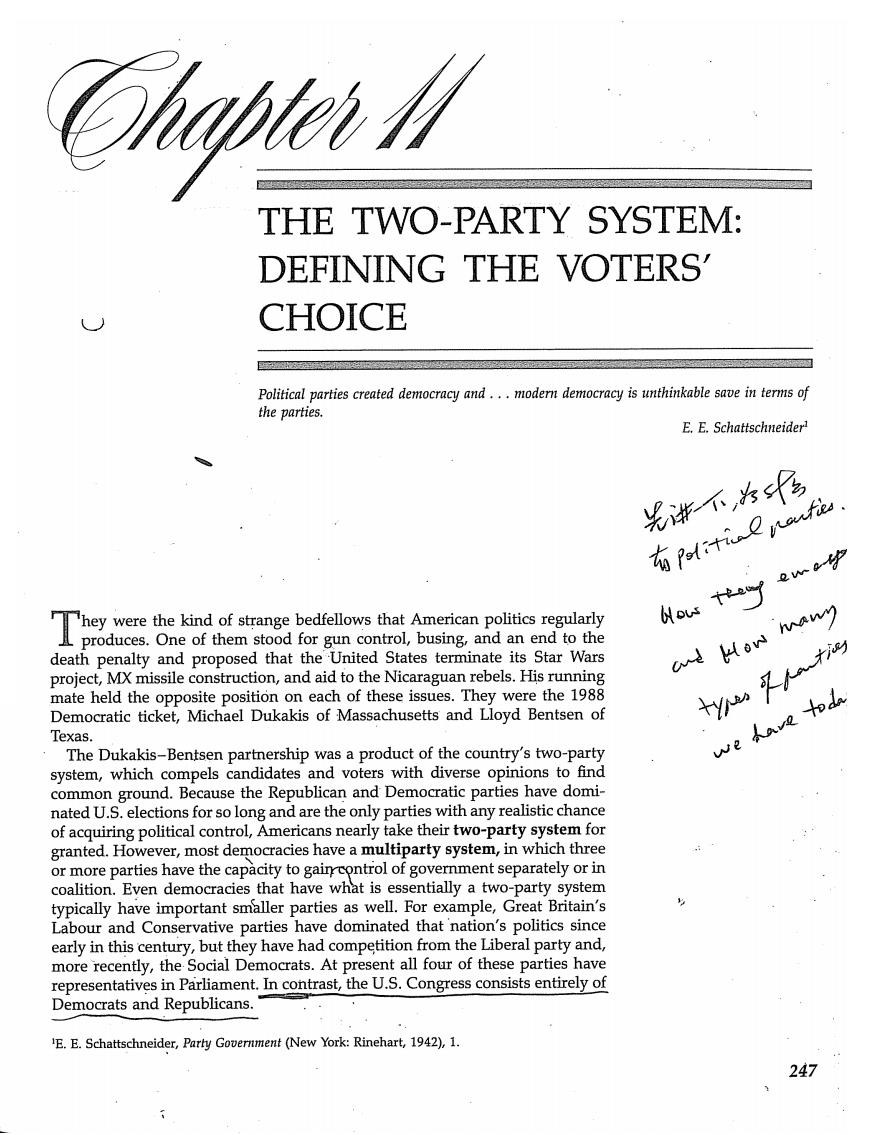
(hg从 THE TWO-PARTY SYSTEM: DEFINING THE VOTERS CHOICE Political parties created democracy and...modern democracy is unthinkable save in terms of the parties. E.E.Schattschneider 光不,片 有politi巴uf品 poduc ne e inn 从est death penalty and proposed that the United States terminate its Star Wars 是Hoy project,MX missile construction,and aid to the Nicaraguan rebels.His running mate held the opposite position on each of these issues.They were the 1988 Democratic ticket,Michael Dukakis of Massachusetts and Lloyd Bentsen of w平测 Texas. The Dukakis-Bentsen partnership was a product of the country's two-party we lave toda system,which compels candidates and voters with diverse opinions to find common ground.Because the Republican and Democratic parties have domi- nated U.S.elections for so long and are the only parties with any realistic chance of acquiring political control,Americans nearly take their two-party system for granted.However,most democracies have a multiparty system,in which three or more parties have the capacity to gaircontrol of government separately or in coalition.Even democracies that have what is essentially a two-party system typically have important smaller parties as well.For example,Great Britain's Labour and Conservative parties have dominated that nation's politics since early in this century,but they have had competition from the Liberal party and, more recently,the Social Democrats.At present all four of these parties have representatives in Parliament.In contrast,the U.S.Congress consists entirely of Democrats and Republicans. E.E.Schattschneider,Party Government (New York:Rinehart,1942),1. 247
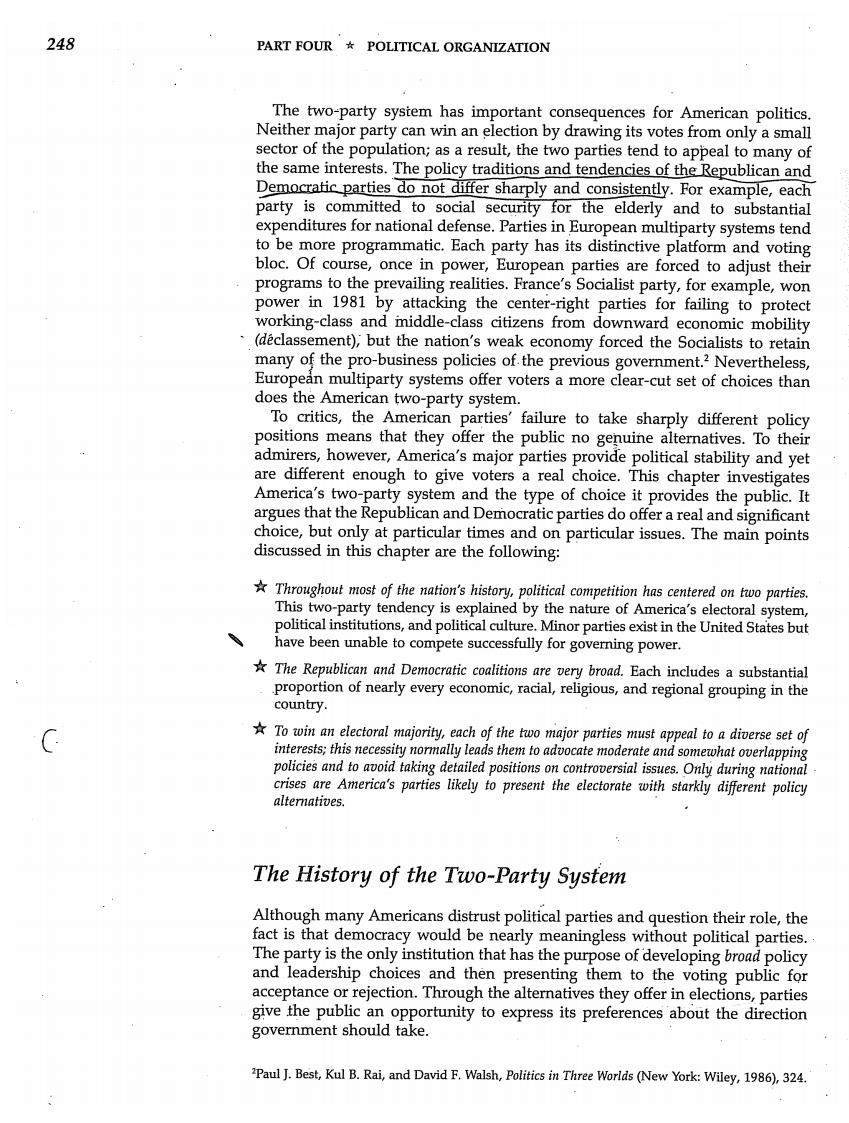
248 PART FOUR POLITICAL ORGANIZATION The two-party system has important consequences for American politics Neither major party can win an election by drawing its votes from only a small sector of the population;as a result,the two parties tend to appeal to many of the same interests.The policy traditions and tendencies of the Republican and Democratic parties do not differ sharply and consistently.For example,each party is committed to social security for the elderly and to substantial expenditures for national defense.Parties in European multiparty systems tend to be more programmatic.Each party has its distinctive platform and voting bloc.Of course,once in power,European parties are forced to adjust their programs to the prevailing realities.France's Socialist party,for example,won power in 1981 by attacking the center-right parties for failing to protect working-class and mniddle-class citizens from downward economic mobility (declassement),but the nation's weak economy forced the Socialists to retain many of the pro-business policies of the previous government.2 Nevertheless, European multiparty systems offer voters a more clear-cut set of choices than does the American two-party system. To critics,the American parties'failure to take sharply different policy positions means that they offer the public no genuine alternatives.To their admirers,however,America's major parties provide political stability and yet are different enough to give voters a real choice.This chapter investigates America's two-party system and the type of choice it provides the public.It argues that the Republican and Democratic parties do offer a real and significant choice,but only at particular times and on particular issues.The main points discussed in this chapter are the following: *Throughout most of the nation's history,political competition has centered on two parties. This two-party tendency is explained by the nature of America's electoral system, political institutions,and political culture.Minor parties exist in the United States but have been unable to compete successfully for governing power. The Republican and Democratic coalitions are very broad.Each includes a substantial proportion of nearly every economic,racial,religious,and regional grouping in the country. C To win an electoral majority,each of the two major parties must appeal to a diverse set of interests;this necessity normally leads them to advocate moderate and somewhat overlapping policies and to avoid taking detailed positions on controversial issues.Only during national crises are America's parties likely to present the electorate with starkly different policy alternatives. The History of the Two-Party System Although many Americans distrust political parties and question their role,the fact is that democracy would be nearly meaningless without political parties. The party is the only institution that has the purpose of developing broad policy and leadership choices and then presenting them to the voting public for acceptance or rejection.Through the alternatives they offer in elections,parties give the public an opportunity to express its preferences about the direction government should take. Paul J.Best,Kul B.Rai,and David F.Walsh,Politics in Three Worlds (New York:Wiley,1986),324
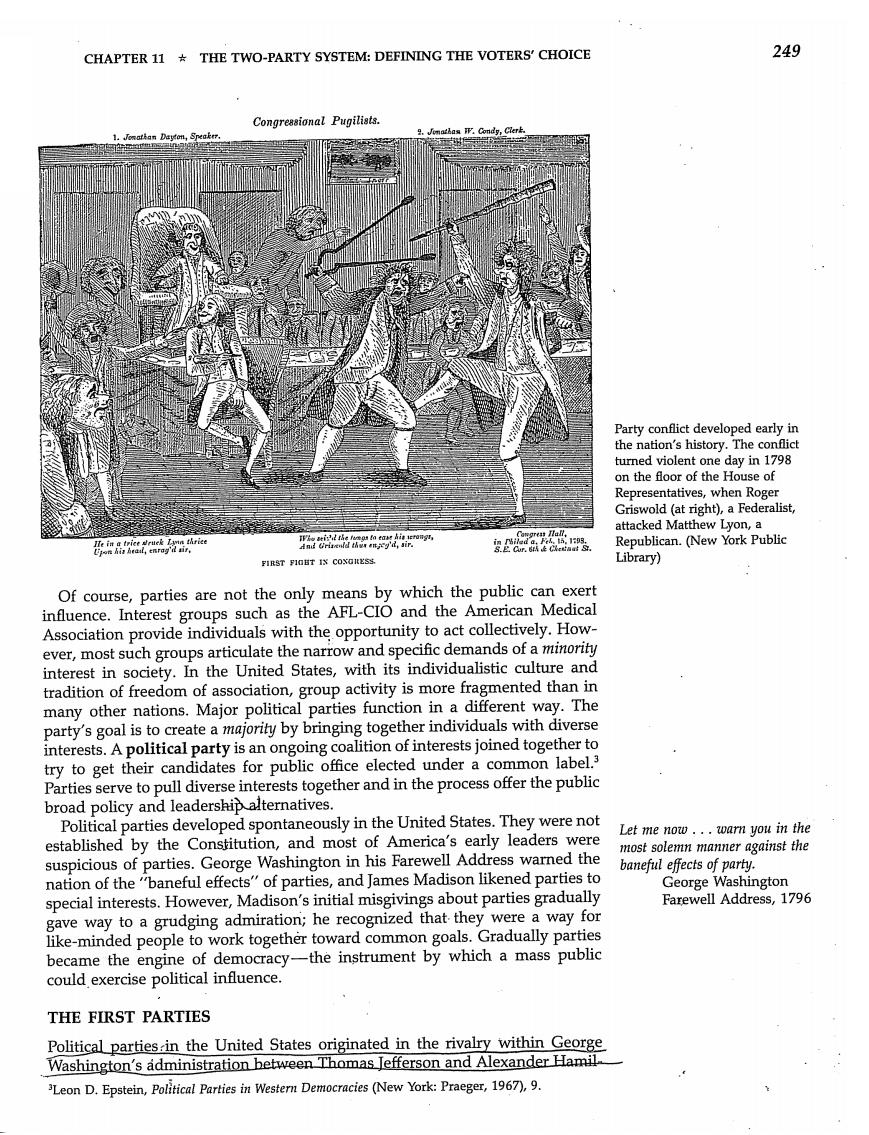
CHAPTER 11 THE TWO-PARTY SYSTEM:DEFINING THE VOTERS'CHOICE 249 Congreasional Pugilists. Party conflict developed early in the nation's history.The conflict turned violent one day in 1798 on the floor of the House of Representatives,when Roger Griswold(at right),a Federalist, attacked Matthew Lyon,a 你和品aa…ia: nr 器器 Republican.(New York Public FIRST FIOBT IX COXORESS Library) Of course,parties are not the only means by which the public can exert influence.Interest groups such as the AFL-CIO and the American Medical Association provide individuals with the opportunity to act collectively.How- ever,most such groups articulate the narrow and specific demands of a minority interest in society.In the United States,with its individualistic culture and tradition of freedom of association,group activity is more fragmented than in many other nations.Major political parties function in a different way.The party's goal is to create a majority by bringing together individuals with diverse interests.A political party is an ongoing coalition of interests joined together to try to get their candidates for public office elected under a common label.3 Parties serve to pull diverse interests together and in the process offer the public broad policy and leadership alternatives. Political parties developed spontaneously in the United States.They were not Let me now...warn you in the established by the Constitution,and most of America's early leaders were most solemn manner against the suspicious of parties.George Washington in his Farewell Address warned the baneful effects of party. nation of the"baneful effects"of parties,and James Madison likened parties to George Washington special interests.However,Madison's initial misgivings about parties gradually Farewell Address,1796 gave way to a grudging admiration;he recognized that they were a way for like-minded people to work together toward common goals.Gradually parties became the engine of democracy-the instrument by which a mass public could exercise political influence. THE FIRST PARTIES Political parties in the United States originated in the rivalry within George Washington's administration between Thomas Jefferson and Alexander Hamil Leon D.Epstein,Political Parties in Western Democracies (New York:Praeger,1967),9
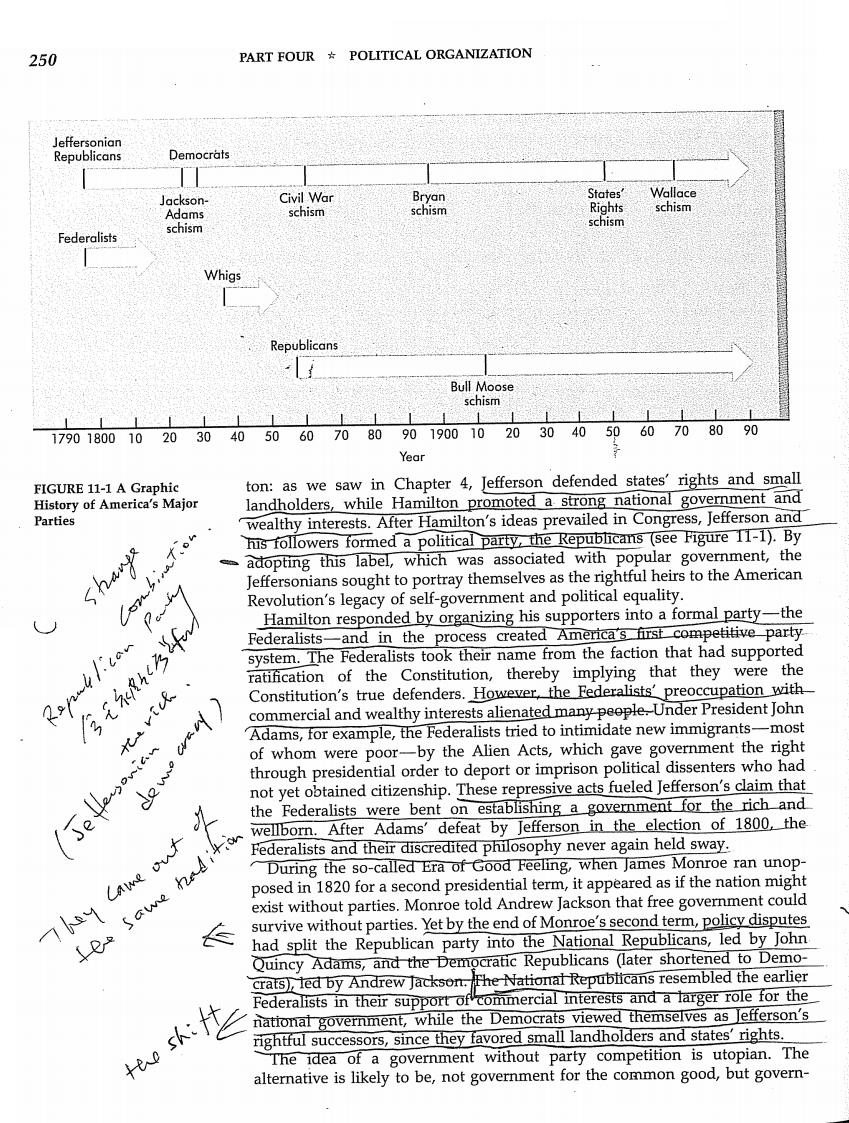
250 PART FOUR POLITICAL ORGANIZATION Jeffersonian Republicans Democrats Civil War Bryan States' Wallace Jackson- schism schism Rights schism Adams schism schism Federalists Whigs Republicans Bull Moose schism 1790180010 20304050607080901900102030405060708090 Year FIGURE 11-1 A Graphic ton:as we saw in Chapter 4,Jefferson defended states'rights and small History of America's Major landholders,while Hamilton promoted a strong national government and Parties wealthy interests.After Hamilton's ideas prevailed in Congress,Jefferson and his followers formed a political party,the Republicans (see Figure 11-1).By adopting this label,which was associated with popular government,the Jeffersonians sought to portray themselves as the rightful heirs to the American Revolution's legacy of self-government and political equality. Hamilton responded by organizing his supporters into a formal party-the Federalists-and in the process created America's first competitive party system.The Federalists took their name from the faction that had supported ratification of the Constitution,thereby implying that they were the Constitution's true defenders.However,the Federalists'preoccupation with commercial and wealthy interests alienated many people.Under President John Adams,for example,the Federalists tried to intimidate new immigrants-most of whom were poor-by the Alien Acts,which gave government the right through presidential order to deport or imprison political dissenters who had not yet obtained citizenship.These repressive acts fueled Jefferson's claim that the Federalists were bent on establishing a government for the rich and wellborn.After Adams'defeat by Jefferson in the election of 1800,the Federalists and their discredited philosophy never again held sway. During the so-called Era of Good Feeling,when James Monroe ran unop- 乙Ae posed in 1820 for a second presidential term,it appeared as if the nation might exist without parties.Monroe told Andrew Jackson that free government could survive without parties.Yet by the end of Monroe's second term,policy disputes (eR had split the Republican party into the National Republicans,led by John Quincy Adams,and the Democratic Republicans (later shortened to Demo- crats),led by Andrew Jackson. The National Republicans resembled the earlier Federalists in their support of commercial interests and a larger role for the national government,while the Democrats viewed themselves as Jefferson's rightful successors,since they favored small landholders and states'rights. The idea of a government without party competition is utopian.The alternative is likely to be,not government for the common good,but govern-
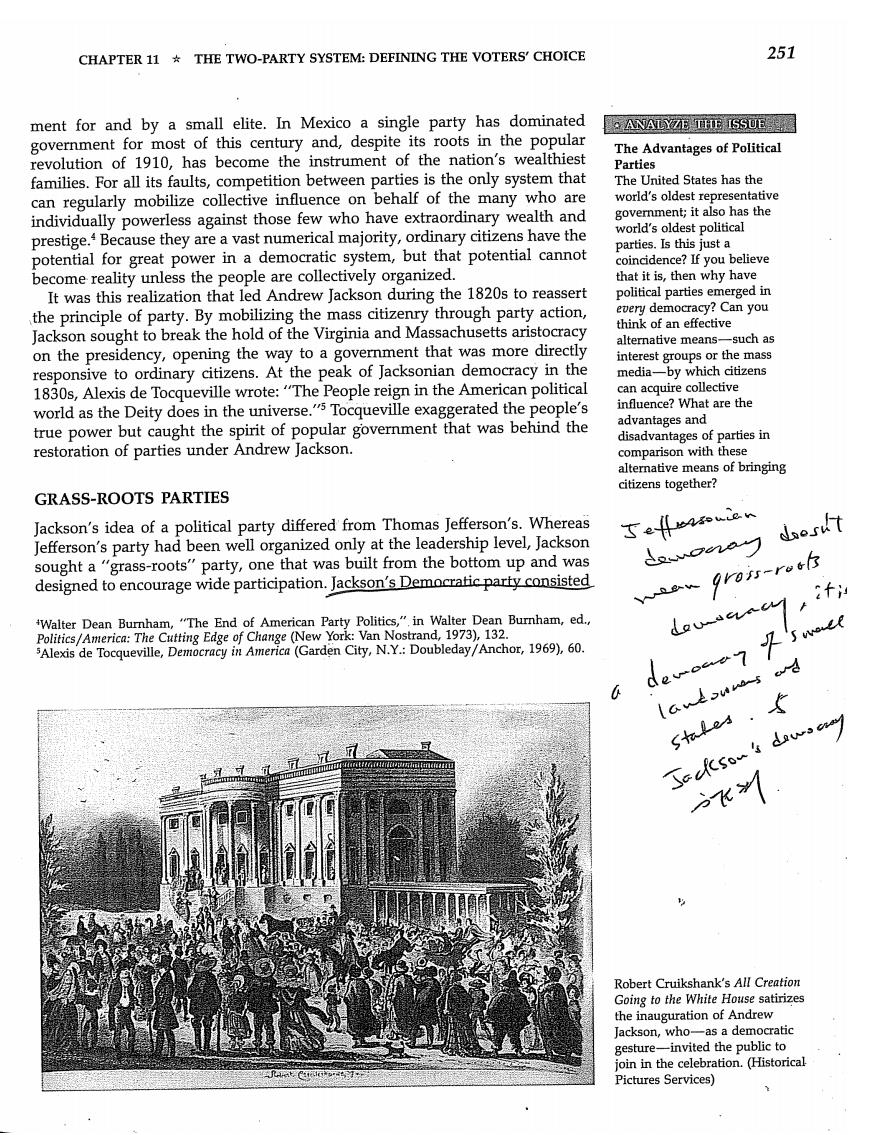
CHAPTER 11 THE TWO-PARTY SYSTEM:DEFINING THE VOTERS'CHOICE 251 ment for and by a small elite.In Mexico a single party has dominated ANALYZE THE1SSUE覆 government for most of this century and,despite its roots in the popular The Advantages of Political revolution of 1910,has become the instrument of the nation's wealthiest Parties families.For all its faults,competition between parties is the only system that The United States has the can regularly mobilize collective influence on behalf of the many who are world's oldest representative individually powerless against those few who have extraordinary wealth and government;it also has the prestige.Because they are a vast numerical majority,ordinary citizens have the world's oldest political potential for great power in a democratic system,but that potential cannot parties.Is this just a coincidence?If you believe become reality unless the people are collectively organized. that it is,then why have It was this realization that led Andrew Jackson during the 1820s to reassert political parties emerged in the principle of party.By mobilizing the mass citizenry through party action, every democracy?Can you Jackson sought to break the hold of the Virginia and Massachusetts aristocracy think of an effective alternative means-such as on the presidency,opening the way to a government that was more directly interest groups or the mass responsive to ordinary citizens.At the peak of Jacksonian democracy in the media-by which citizens 1830s,Alexis de Tocqueville wrote:"The People reign in the American political can acquire collective world as the Deity does in the universe."Tocqueville exaggerated the people's influence?What are the true power but caught the spirit of popular government that was behind the advantages and disadvantages of parties in restoration of parties under Andrew Jackson. comparison with these alternative means of bringing citizens together? GRASS-ROOTS PARTIES Jackson's idea of a political party differed from Thomas Jefferson's.Whereas Jefferson's party had been well organized only at the leadership level,Jackson sought a"grass-roots"party,one that was built from the bottom up and was designed to encourage wide participation.Jackson's Democratic party consisted Walter Dean Burnham,"The End of American Party Politics,".in Walter Dean Burnham,ed., Politics/America:The Cutting Edge of Change (New York:Van Nostrand,1973),132. SAlexis de Tocqueville,Democracy in America(Garden City,N.Y.:Doubleday/Anchor,1969),60. d Stules Robert Cruikshank's All Creation Going to the White House satirizes the inauguration of Andrew Jackson,who-as a democratic gesture-invited the public to join in the celebration.(Historical Pictures Services)